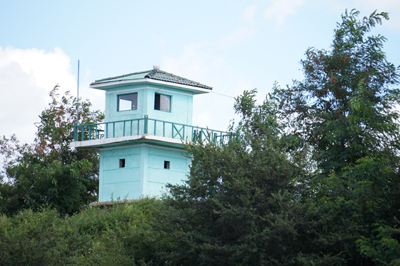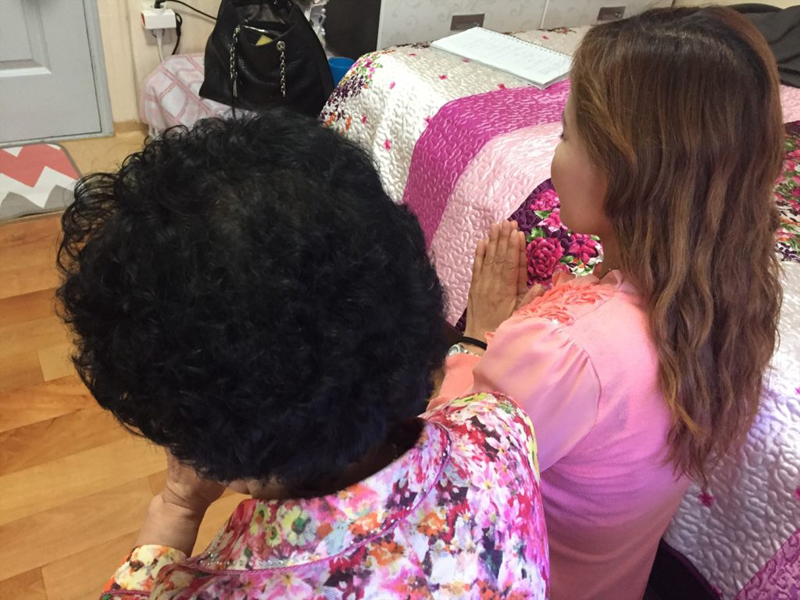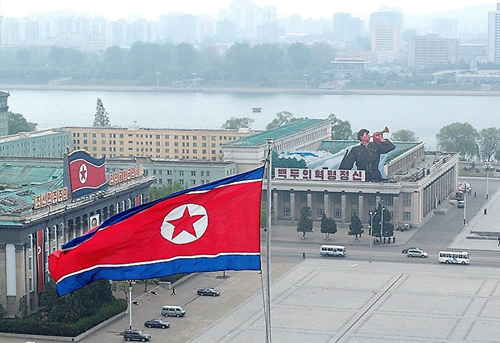As North Korea’s missile testing focuses the world’s attention on Kim Jong-un’s regime, one woman’s story shows how harshly families are treated when they refuse to follow his authoritarian rules. World Watch Monitor reports…
Hannah Cho* was born just before the Korean War broke out in 1950. She remembered the air-raid sirens and holding on to her father’s back as they climbed into the mountains to survive another night of bombing.
After the war, with public religion discouraged, her local church was turned into a school. Her Christian mother continued to pray at home but Hannah and her father kept watch for neighbours who might inform the authorities about her faith.

North Korean flag flying over Kim Il-sung Square in the capital, Pyongyang. PICTURE: World Watch Monitor
“We had no idea who this ‘Hananim‘ was. My daughter even asked her one day why she wouldn’t simply visit this guy if he was that important to her. My mother replied: ‘One day I will.’”
– Hannah
“If anyone came close, we’d cough and she’d stop praying,” Hannah said. “Sometimes my father was annoyed with her and didn’t want her praying in the living room, so she went outside, even when it was snowing. Once I sent my nine-year-old daughter after her to cover her up with a blanket.”
Hannah wanted to understand her mother’s faith, but she spoke so fast when she prayed that it was difficult to understand: “All we could make out was: ‘Hananim, Hananim!’ [Lord! Lord! Help]” she said.
“We had no idea who this ‘Hananim‘ was. My daughter even asked her one day why she wouldn’t simply visit this guy if he was that important to her. My mother replied: ‘One day I will.’”
“Because of my mum’s prayers, I was never as indoctrinated by the Juche [self-reliance] ideology as others,” Hannah said. “Especially after she told me how I was born. My parents married during Japanese occupation (1910-1945). My father had been married before, but he was unable to have children with his first wife. And my mum was also unable to conceive. But someone told her that if she prayed to Jesus she would have a baby. For almost eight years she prayed. And then, not long after the Second World War, I was born.”
Hannah’s mother said nothing to her about her Christian faith until her marriage at the age of 23.
Life in North Korea grew more difficult for Hannah after her marriage.
“I bore six children, two of them died very early on. I still have three daughters and a son. My husband used to work in a factory, but when the economy collapsed there was no more work, and no more income,” she said.
“I had to care for my family. I had all kinds of jobs. In a factory and also selling stuff on the black market. I travelled from the east of the country to the west. Because I was traveling illegally, many times I had to jump from the train before it came to a complete stop. Once, my leg got stuck and I was badly injured. The injury, the heavy work and the hardships damaged my spine. I can’t straighten my back anymore. Sometimes I carried heavy frozen meat up the mountains, so I could later sell it on the black market. This cost me my finger- and toe-nails. There was never any money for proper medical care.”
After Hannah’s mother died, she and her family decided to leave North Korea for China.
“My eldest daughters were first to flee, but they were betrayed by the broker. They were supposed to meet with a relative of my husband but were sold into marriage to poor Chinese farmers. Fortunately, they were sold to families in the same village, so could stay in touch with each other,” she said.
“My eldest daughters were first to flee, but they were betrayed by the broker. They were supposed to meet with a relative of my husband but were sold into marriage to poor Chinese farmers. Fortunately, they were sold to families in the same village, so could stay in touch with each other.”
– Hannah
“When we didn’t hear from them, my husband went to China to try to find them. Meanwhile, I took care of my two youngest children at home. My husband didn’t come back; a year later, I went to look for them all in China. At first, I couldn’t locate my husband. I worked on a Chinese farm as a maid, but didn’t receive any money. I had lost everything that was dear to me. I prayed to God with the only words I knew: “Hanonim, Hanonim!” Finally, I found my husband’s relative and he connected me with my husband, but my daughters were still missing.”
Hannah’s husband went back to North Korea to collect the two youngest children, who had stayed with family, and take them back across the border to China. He also discovered where the two older daughters were.
“A few weeks later our entire family was reunited in China,” Hannah said.
The family settled into their new life together and started to attend the church of a relative, where they all converted to the Christian faith.
“We had seen my mother’s faith, but now we understood it,” Hannah said. “We felt peace in our hearts and unexplainable joy. It was so refreshing, as if the specks in my eyes had been washed away and I could finally see God. Now I could follow Him like my mother had. The pastor taught us about Christ and the Christian life. Our faith grew very quickly because we had been prepared all our lives for this moment.”
After two weeks the two eldest daughters went back to their Chinese families. “They were safer there,” Hannah said, “but we promised each other to stay in touch.”
Arrested
Sadness soon followed the joy of the family reunion.
“We were discovered by Chinese secret agents and arrested,” Hannah recalled. “They moved us from prison to prison until we were finally sent back to North Korea. We’d hardly arrived when we witnessed a terrible scene. A woman in prison was pregnant by a Chinese man. Race is very important in North Korea: the pure race may never be defiled. To mix Korean blood with Chinese blood is a terrible ‘sin’. The woman gave birth in prison, but then the guard ordered her to kill her baby, but she couldn’t. The guard threatened another woman, telling her he would let her live if she killed the baby. He put his gun to her head and the inmate had no other choice but to strangle the baby until he died. And we had to watch.”
The family were separated in the prison – her husband and teenage son in the male wing, Hannah and daughter with the women. They were beaten and interrogated. When that was over, they were forced to kneel in their cells – sometimes from 5am until midnight – and not speak.
“My husband was treated badly. He told the guards he’d become a Christian. Later, he told us he had no choice. After he saw what they did with the baby and the guards threatened to kill his family, he had to tell them the truth. After his confession, all four of us were locked up in solitary confinement – a small cage. We didn’t receive any food or water and couldn’t sleep,” Hannah said.
“Prisoners in solitary confinement were badly beaten. Nobody dared resist because you’d only make the torture worse. But my husband was different. The more they tortured him, the harder he defended his faith. He yelled at them: ‘If believing in God is a sin, I’d rather die! Just kill me! It’s my mission to live according to God’s will!’
“Each time he spoke out against them, they stripped his clothes and beat him up as if he was an animal. His flesh was torn and ripped. When he lost consciousness, they woke him and started again.
“I felt close to dying. I was dehydrated and beaten until I was unconscious too. When I woke up, I was dragged back to a regular cell with my daughter and other female inmates. Then they beat me in front of them. All my daughter could do was cry silently, which she did day and night.
“Of course, we prayed throughout our time in prison. One day, our entire family was called out of the prison cell. That was a bad omen. Usually when people are taken from their cells during the night they are transferred to a camp for political prisoners.

Hannah (left) praying with her eldest daughter in April. PICTURE: World Watch Monitor
“When we got to the office, there were two male prisoners. I recognised my son, but the other was in such a bad shape, I didn’t recognise my husband and he didn’t recognise me. That’s how horrendous we looked from all the torture. His ribs and collarbone were broken, so he couldn’t even stand up straight. But I realised it was him.
“We were in front of the prison deputy, waiting to hear our verdict. We all desperately prayed for a miracle. We didn’t want to suffer and die in a political prisoner camp. But the deputy gave us a special amnesty. When we walked out of the prison that night and were finally free and alone, we quietly sang a hymn.”
Separated again
Hannah continued: “We went to our old home to recover, but we still feared for our lives. Life in North Korea was too dangerous and too hard. My husband suggested that I take my daughter first and go back to China. ‘Don’t look for a job,’ he said. ‘Just go to our church where you will be helped. I will come with our son in about a month.’
“I did what he said and reached our church safely with our daughter. A month went by. No word from my husband. Then, a second month, a third, a fourth… I waited three years. Then I found out that he had died shortly after we left North Korea. He was never able to overcome the pain and illnesses from prison.
“My son could not cross the river by himself. He is still in North Korea. I haven’t seen or spoken to him in many years. I will never give up hope of finding him.
“About two years ago I found out that he is still alive and lives with a family member. We were even able to phone each other once. I now live in South Korea. My first and third daughter are here with me. My second daughter lives in China with her husband. She is still at risk of being discovered and sent back. I hope one day I will be reunited in South Korea with that daughter and my son.
“My mother only taught me one prayer. But I still pray it every day, for my family and for my country: ‘Hanonim, Hanonim! – Lord, Lord, please help!’”
* Name has been changed for security reasons






